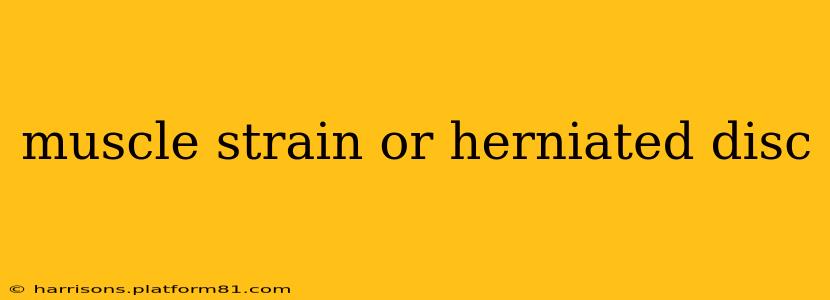Back pain is a common ailment, affecting millions worldwide. Two frequent causes are muscle strains and herniated discs. While both can cause significant discomfort, understanding the differences is crucial for proper diagnosis and treatment. This article will delve into the distinctions between muscle strains and herniated discs, addressing common questions and providing valuable information for managing back pain effectively.
What is a Muscle Strain?
A muscle strain, also known as a pulled muscle, occurs when muscles or tendons in the back are overstretched or torn. This often happens due to sudden movements, overuse, or poor posture. Symptoms of a muscle strain typically include:
- Localized pain: The pain is usually concentrated in the affected muscle area.
- Muscle spasms: Involuntary muscle contractions can cause significant discomfort.
- Stiffness: Movement may be restricted due to pain and inflammation.
- Tenderness to the touch: The affected area feels sore when touched.
- Mild swelling: Some swelling might be present.
The severity of a muscle strain can range from mild to severe, depending on the extent of the muscle damage.
What is a Herniated Disc?
A herniated disc, also known as a slipped or ruptured disc, occurs when the soft, gel-like center of an intervertebral disc pushes through a tear in the tougher outer layer. This can put pressure on nearby nerves, leading to pain, numbness, or weakness. Symptoms of a herniated disc can include:
- Radiating pain: Pain often extends down the leg (sciatica) or arm, following the path of the affected nerve.
- Numbness or tingling: This is a common symptom, often in the leg or arm.
- Muscle weakness: Weakness in the affected limb might develop.
- Severe back pain: The pain can be intense and debilitating.
- Limited range of motion: Bending, twisting, or lifting may be difficult.
How Can I Tell the Difference Between a Muscle Strain and a Herniated Disc?
Distinguishing between a muscle strain and a herniated disc can be challenging, and self-diagnosis is not recommended. The symptoms can overlap, and only a medical professional can provide an accurate diagnosis. However, some key differences can help guide you:
- Location of Pain: Muscle strains usually cause localized pain, while herniated discs often cause radiating pain down the leg or arm.
- Nerve Symptoms: Numbness, tingling, and muscle weakness are more indicative of a herniated disc.
- Onset of Pain: Muscle strains often occur after a specific incident, like lifting something heavy, while herniated discs can develop gradually over time.
What are the Treatment Options for a Muscle Strain?
Treatment for muscle strains typically focuses on conservative methods such as:
- Rest: Avoid activities that aggravate the pain.
- Ice: Applying ice packs can reduce swelling and inflammation.
- Over-the-counter pain relievers: Medications like ibuprofen or naproxen can help manage pain and inflammation.
- Physical therapy: A physical therapist can guide you through exercises to strengthen your back and improve flexibility.
What are the Treatment Options for a Herniated Disc?
Treatment for herniated discs also frequently employs conservative methods, such as:
- Rest: Limiting activities that worsen the pain.
- Medication: Over-the-counter pain relievers, muscle relaxants, or stronger prescription medications may be prescribed.
- Physical therapy: Exercises can help strengthen the back muscles and improve core stability.
- Epidural steroid injections: These injections can reduce inflammation and pain around the nerve roots.
- Surgery: In severe cases, surgery may be necessary to repair the damaged disc.
How Long Does it Take to Recover from a Muscle Strain?
Recovery time for a muscle strain varies depending on the severity of the injury. Mild strains may heal within a few weeks, while more severe strains can take several months.
How Long Does it Take to Recover from a Herniated Disc?
Recovery from a herniated disc also varies depending on severity and treatment. Conservative treatments can take weeks or months, while surgery may require a longer recovery period.
Can a Muscle Strain Lead to a Herniated Disc?
While a muscle strain itself doesn't directly cause a herniated disc, persistent muscle imbalances or improper lifting techniques can put additional strain on the spine, potentially contributing to the risk of a herniated disc over time. Maintaining good posture and practicing proper lifting techniques is crucial for preventing both injuries.
Disclaimer: This information is for educational purposes only and should not be considered medical advice. Always consult a healthcare professional for diagnosis and treatment of any medical condition.
